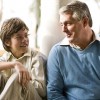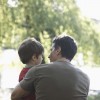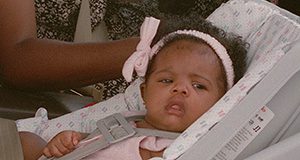Feeding your baby is one of the first things you do as a parent. It is also one of the ways that you develop a relationship with this new family member. When feeding goes well, everyone in the family is happier. This 3-page publication can help you develop a close feeding relationship with your baby. The skills you learn will also help you and your child avoid conflicts over food during the toddler and preschool years. Written by Linda B. Bobroff and Nicole Owens Duffy, and published by the UF/IFAS Department of Family, Youth and Community Sciences, revised March 2019.
http://edis.ifas.ufl.edu/he964
Tag: Parenting
Love and Acceptance Are Crucial to Development Worldwide
 If you’ve ever traveled to another country, perhaps one far across the world, you may have been struck by the universal nature of the tender and sometimes tricky relationship between parent and child. Now a new analysis of 36 studies from 18 countries, published in the journal Personality and Social Psychology Review, confirms some important truths about how parents can affect their children for a lifetime. This 2-page Family Album Radio transcript was written by Carol Church, and published by the UF Department of Family Youth and Community Sciences, August 2013.
If you’ve ever traveled to another country, perhaps one far across the world, you may have been struck by the universal nature of the tender and sometimes tricky relationship between parent and child. Now a new analysis of 36 studies from 18 countries, published in the journal Personality and Social Psychology Review, confirms some important truths about how parents can affect their children for a lifetime. This 2-page Family Album Radio transcript was written by Carol Church, and published by the UF Department of Family Youth and Community Sciences, August 2013.
http://edis.ifas.ufl.edu/fm1135
Family Reunification Following Foster Care (FCS2328/FY1366)
 Families reuniting after an intervention that requires foster care for the children face unique challenges. Parents in these situations may need to learn about their parental roles, the basic needs for the healthy development of their children, and resources that will help the family in their reunification. Researchers and practitioners in child welfare have provided helpful information to develop workable plans to aid families in reunifying and rebuilding. This 5-page fact sheet is a brief summary of the overarching themes provided by the literature. Written by Rosalyn Monroe and Victor W. Harris, and published by the UF Department of Family Youth and Community Sciences, April 2013.
Families reuniting after an intervention that requires foster care for the children face unique challenges. Parents in these situations may need to learn about their parental roles, the basic needs for the healthy development of their children, and resources that will help the family in their reunification. Researchers and practitioners in child welfare have provided helpful information to develop workable plans to aid families in reunifying and rebuilding. This 5-page fact sheet is a brief summary of the overarching themes provided by the literature. Written by Rosalyn Monroe and Victor W. Harris, and published by the UF Department of Family Youth and Community Sciences, April 2013.
http://edis.ifas.ufl.edu/fy1366
Unplanned Pregnancy's Effects on Mothers and Children (FAR5124/FM1050)
 “Nearly half of all pregnancies in the US today are unplanned. Though this surprise can be a wonderful one, it can also be a difficult adjustment. Indeed, some studies connect unplanned pregnancies with higher levels of stress and depression in mothers in the early months. But could the aftereffects of an unintended pregnancy linger even longer? …”
“Nearly half of all pregnancies in the US today are unplanned. Though this surprise can be a wonderful one, it can also be a difficult adjustment. Indeed, some studies connect unplanned pregnancies with higher levels of stress and depression in mothers in the early months. But could the aftereffects of an unintended pregnancy linger even longer? …”
This 2-page Family Album Radio transcript was written by Carol Church, and published by the UF Department of Family Youth and Community Sciences, February 2013.
http://edis.ifas.ufl.edu/fm1050
Foster Parenting (FAR0008/FM065)
 “Eddie Murphy, Duane Culpepper, Superman, Marilyn Monroe, Alonzo Mourning, Cher, Ice T, John Lennon, James Dean, and Babe Ruth: What do all these people have in common? They were foster kids! Foster parenting is a job that gets little attention and is in great demand. It involves taking a child into your home: a child who has been abused, neglected, or abandoned, or whose primary caregivers are unable to meet their parenting duties—and caring for them as if they are one of your own…” This 2-page Family Album Radio transcript was written by Amanda Quaas and Suzanna Smith, and published by the UF Department of Family Youth and Community Sciences, February 2013.
“Eddie Murphy, Duane Culpepper, Superman, Marilyn Monroe, Alonzo Mourning, Cher, Ice T, John Lennon, James Dean, and Babe Ruth: What do all these people have in common? They were foster kids! Foster parenting is a job that gets little attention and is in great demand. It involves taking a child into your home: a child who has been abused, neglected, or abandoned, or whose primary caregivers are unable to meet their parenting duties—and caring for them as if they are one of your own…” This 2-page Family Album Radio transcript was written by Amanda Quaas and Suzanna Smith, and published by the UF Department of Family Youth and Community Sciences, February 2013.
http://edis.ifas.ufl.edu/fm065
What Middle Schoolers Want to Talk About (FAR0804/FM246)
 “Can your middle-schooler talk to you? Most 10- to 14-year-olds want a warm, close relationship with their parents. However, only about a quarter of adolescents nationwide find their parents ‘approachable and available to talk.'” This 2-page Family Album Radio transcript was written by Suzanna Smith, and published by the UF Department of Family Youth and Community Sciences, September 2012.
“Can your middle-schooler talk to you? Most 10- to 14-year-olds want a warm, close relationship with their parents. However, only about a quarter of adolescents nationwide find their parents ‘approachable and available to talk.'” This 2-page Family Album Radio transcript was written by Suzanna Smith, and published by the UF Department of Family Youth and Community Sciences, September 2012.
http://edis.ifas.ufl.edu/fm246
Talking to Children about Disasters (FAR8038/FM248)
 “Natural disasters, refugees displaced from their homes, loss of life . . . even for adults, these tragic events are difficult to understand. Children, too, may find these incidents especially troubling. Adults can help young people make sense of disasters and deal with their feelings by following a few guidelines.” This 2-page Family Album Radio transcript was written by Suzanna Smith, and published by the UF Department of Family Youth and Community Sciences, September 2012.
“Natural disasters, refugees displaced from their homes, loss of life . . . even for adults, these tragic events are difficult to understand. Children, too, may find these incidents especially troubling. Adults can help young people make sense of disasters and deal with their feelings by following a few guidelines.” This 2-page Family Album Radio transcript was written by Suzanna Smith, and published by the UF Department of Family Youth and Community Sciences, September 2012.
http://edis.ifas.ufl.edu/fm248
Teen Binge Drinking (FAR1201/FM362)
 “Raising teenagers is a tough job. I know I’m not the only mom who worries about the challenges our children face, including the issue of teenage drinking. There are many reasons to be concerned: Youth who use alcohol are at greater risk for unprotected sexual intercourse, coerced sexual activity, use of marijuana, and poor academic performance.” This 2-page Family Album Radio transcript was written by Suzanna Smith and published by the UF Department of Family Youth and Community Sciences, August 2012.
“Raising teenagers is a tough job. I know I’m not the only mom who worries about the challenges our children face, including the issue of teenage drinking. There are many reasons to be concerned: Youth who use alcohol are at greater risk for unprotected sexual intercourse, coerced sexual activity, use of marijuana, and poor academic performance.” This 2-page Family Album Radio transcript was written by Suzanna Smith and published by the UF Department of Family Youth and Community Sciences, August 2012.
http://edis.ifas.ufl.edu/fm362
Adolescent TV Use (FAR1206/FM401)
 “More than likely you’ve commonly heard the most recent generations referred to as Generation X and now Generation Y. However, in a new report from the Kaiser Family Foundation, researchers renamed this younger group as “Generation M” to stand for media influence in their lives. Indeed, there are days that I wonder if my children can unplug from the many digital and electronic devices in their lives.” This 2-page Family Album Radio transcript was written by Donna Davis and published by the UF Department of Family Youth and Community Sciences, August 2012.
“More than likely you’ve commonly heard the most recent generations referred to as Generation X and now Generation Y. However, in a new report from the Kaiser Family Foundation, researchers renamed this younger group as “Generation M” to stand for media influence in their lives. Indeed, there are days that I wonder if my children can unplug from the many digital and electronic devices in their lives.” This 2-page Family Album Radio transcript was written by Donna Davis and published by the UF Department of Family Youth and Community Sciences, August 2012.
http://edis.ifas.ufl.edu/fm401
Adolescent Bullying and Family Therapy (FAR1204/FM399)
 “As much as parents like to think that bullying is something that’s outgrown in childhood, unfortunately it’s actually on the increase in adolescence. There are various individual and school-based approaches to dealing with bullying, but a new intervention that you might find surprising is none other than family therapy. ” This 2-page Family Album Radio transcript was written by Kate Fogarty, and published by the UF Department of Family Youth and Community Sciences, August 2012.
“As much as parents like to think that bullying is something that’s outgrown in childhood, unfortunately it’s actually on the increase in adolescence. There are various individual and school-based approaches to dealing with bullying, but a new intervention that you might find surprising is none other than family therapy. ” This 2-page Family Album Radio transcript was written by Kate Fogarty, and published by the UF Department of Family Youth and Community Sciences, August 2012.
http://edis.ifas.ufl.edu/fm399
How Family Environment Influences Teens (FAR1218/FM470)
 “After years of hearing how much I should dread the teen years, what a wonderful surprise it was when I found that living with teenagers could actually be not just a pleasant experience, but a fulfilling and wonderful adventure…” This transcript of a two-minute Family Album Radio broadcast was published by the UF Department of Family Youth and Community Sciences, March 2012.
“After years of hearing how much I should dread the teen years, what a wonderful surprise it was when I found that living with teenagers could actually be not just a pleasant experience, but a fulfilling and wonderful adventure…” This transcript of a two-minute Family Album Radio broadcast was published by the UF Department of Family Youth and Community Sciences, March 2012.
http://edis.ifas.ufl.edu/fm470
Ayudándole a su hijo a hacer las tareas (FCS2255Span/FY980)
 Casi todos los estudiantes de la escuela primaria hasta la secundaria recibirán tareas regularmente. Estas tareas pueden ayudar a los niños para:
Casi todos los estudiantes de la escuela primaria hasta la secundaria recibirán tareas regularmente. Estas tareas pueden ayudar a los niños para:
- practicar lo que han aprendido
- recibir información más profunda
- aplicar las habilidades abiertamente
- obtener importantes habilidades organizacionales y de aprendizaje
- aprender a trabajar independientemente
- y con disciplina propia
Por medio de las tareas los padres pueden tener una idea de lo que sus hijos hacen en la escuela, darse cuenta que tan bien va el niño y mejorar su relación con sus hijos.
This 3-page fact sheet is the Spanish language version of “Helping Your Child with Homework,” written by Heidi Liss Radunovich, and published by the UF Department of Family Youth and Community Sciences, September 2011.
http://edis.ifas.ufl.edu/fy980
4H8.5/4H283 Creating positive parental influence in 4-H competitions: A guide for 4-H Volunteers
4H 8.5, a 4-page fact sheet by Deborah L. Nistler and Kate Fogarty, introduces a “4-As” framework for understanding parent motivations for participation in competitive youth programs, and suggests approaches for volunteers to use to encourage parent engagement. Includes references. Published by the UF 4-H Youth Development Program, December 2008.
http://edis.ifas.ufl.edu/4H283
FAR0074/FM327 Co-parenting and Father Involvement
FAR0074, a 2-page transcript of the Family Album Radio Program broadcast by Suzanna Smith, describes research findings about the co-parenting relationships between custodial mothers and fathers living apart from their biological children. Includes references. Published by the UF Department of Family Youth and Community Sciences, March 2009.
http://edis.ifas.ufl.edu/FM327
FAR0071/FM316 The Cost of Young Adults
FAR0071, a 2-page transcript of the Family Album Radio Program broadcast by Suzanna Smith, provides research based information on the types of contributions parents make for young adult children to help them get started. Includes references. Published by the UF Department of Family Youth and Community Sciences, March 2009.
http://edis.ifas.ufl.edu/FM316
FAR0072/FM322 Parental Monitoring Redefined
FAR0072, a 2-page transcript of the Family Album Radio Program broadcast by Kate Fogarty, provides research based information on this parenting behavior that helps youths succeed. Includes references. Published by the UF Department of Family Youth and Community Sciences, March 2009.
http://edis.ifas.ufl.edu/FM322
FCS2286/FY1054 The Importance of Family Dinners
FCS-2286, a 2-page fact sheet by Jodimae Lyttle and Eboni J. Baugh, takes a close look at some family “dinner dynamics” sharing research demonstrating the benefits that eating together can provide family members. Published by the UF Department of Family Youth and Community Sciences, August 2008.
http://edis.ifas.ufl.edu/FY1054
